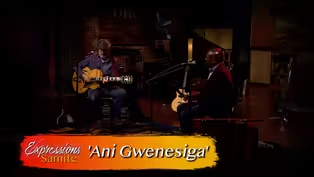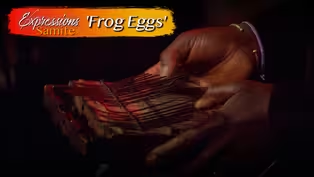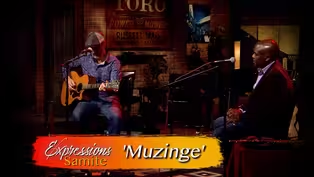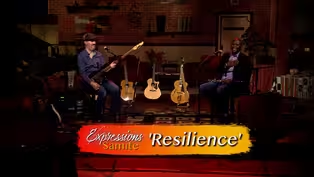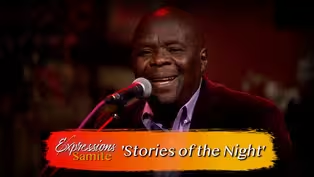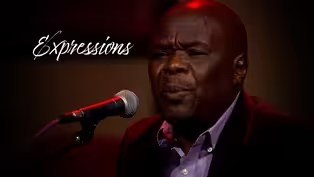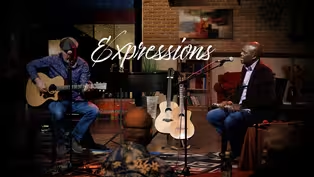
Samite
Season 15 Episode 1 | 27m 55sVideo has Closed Captions
Expressions welcomes Samite for a special concert performance
African folk artist Samite is featured on this episode of Expressions. Using traditional instruments and rhythms, Samite's music is truly unique and the live studio audience was mesmerized with his performance. Samite is joined onstage by longtime friend and collaborator, guitarist Nate Richardson. The program is hosted by Adara Alston.
Problems playing video? | Closed Captioning Feedback
Problems playing video? | Closed Captioning Feedback
Expressions is a local public television program presented by WSKG

Samite
Season 15 Episode 1 | 27m 55sVideo has Closed Captions
African folk artist Samite is featured on this episode of Expressions. Using traditional instruments and rhythms, Samite's music is truly unique and the live studio audience was mesmerized with his performance. Samite is joined onstage by longtime friend and collaborator, guitarist Nate Richardson. The program is hosted by Adara Alston.
Problems playing video? | Closed Captioning Feedback
How to Watch Expressions
Expressions is available to stream on pbs.org and the free PBS App, available on iPhone, Apple TV, Android TV, Android smartphones, Amazon Fire TV, Amazon Fire Tablet, Roku, Samsung Smart TV, and Vizio.
Providing Support for PBS.org
Learn Moreabout PBS online sponsorship(dramatic music) (singing in foreign language) - [Announcer] Performing tonight on "Expressions," Samite.
(singing in foreign language) (tranquil flute music) "Expressions" is made possible by the supportive viewers like you.
Thank you.
(audience applauding) - Hello and welcome to "Expressions."
I am your host Adara Alston.
Tonight's episode features a musician with an amazing story of inspiration.
Samite Mulondo was born and raised in Uganda before coming to the United States at the age of 25.
After a brief stay in New York City, Samite moved to the Ithaca area to continue his musical career that is still going strong today.
Using traditional African instruments and rhythms mixed with modern day production, Samite's original music is truly unique.
Here is Samite performing in front of a live studio audience with long time friend, guitarist Nate Richardson (relaxed guitar music) (singing in foreign language) (audience applauding) (relaxed guitar music) (wordless vocalizing) (singing in foreign language) ♪ My name is not homeless ♪ ♪ My mother calls me baby ♪ (singing in foreign language) ♪ My name is not homeless ♪ ♪ My mother calls me baby ♪ (kalimba music) (singing in foreign language) (kalimba music) (singing in foreign language) (audience applauding) - I was born and raised in Uganda.
I grew up in the outskirts of Kampala.
I started taking interest in music when I was really, really young.
I went to the King's palace as a little kid every day before my parents picked me up.
I would sit and watch these musicians playing these traditional instruments.
And it just like, oh, I love this.
I knew I loved this.
Also, my grandfather used to play the traditional wooden flute, so I've always paid attention to sounds.
What made me me leave Uganda?
We had dictators, bad dictators.
There was a lot of death.
There was a lot of suffering.
There was a lot of fear.
Sometimes you'd hear of people being kidnapped.
You'd hear people being killed.
What made me realize that I need to leave the country is when policemen were walking behind me and I thought they were coming to kidnap me.
They stopped behind me and asked me, "Samite, do you know who we are?"
And I was like, oh no, this is my turn.
And I was getting ready.
I was feeling comfortable to say I'm gonna kill these guys right here.
I'm not gonna be taken away, killed, tortured like my brother.
I'd rather die on the street and with one of them, and they instead, they asked me "When are you performing again?
Last time you performed we managed traffic."
And that's when I knew this is not safe for me.
If I can feel comfortable saying I'm gonna kill somebody rather than be taken away, it was changing me.
The whole situation was changing me, and that's really what made me leave.
Then I migrated to Kenya as a refugee.
There was a band which was the best band in the whole country.
It was called the African Heritage Band.
They were looking for a flute, saxophone player.
So I told them I play flute, I also play saxophone, but I don't have my saxophone.
I left it in Uganda.
So if you gimme this job based on my flute playing that's exactly how I play the saxophone, but I didn't know how to play the saxophone.
Well, I'm not gonna tell them I don't play saxophone.
This is the only job, so you take it and learn, 'cause you know this is your only chance.
But what it is is just basically a refugee trying to survive.
I was in Kenya for five years, was 1987 migrated to New York city.
I didn't have a work permit.
So I was going around in Central Park checking out different groups.
I saw Ladysmith Black Mambazo perform with Paul Simon.
I saw them with a big crowd in Central Park, and I was just like blown away, and little did I know I'm gonna be touring with those guys soon after that.
Musicians for World Harmony was born when I was invited to go back to Africa and said would you want to go and maybe tell a different story from what we are seeing from the media, and also for you to share, to bring some joy with your music there.
And I said, sure, I would like to go.
And to my surprise, when I played flute to these young kids who had seen so much trauma that they had become numb, they'd seen death around them.
They just looked at you like this.
I found out that when just with a little bit flute, they would wake up.
I went from one village to another, from one refugee camo to another playing flute, and then kalimba, And I saw the power, the healing power of music.
It would remind people of how things were before the war, but it also reminded people that things are not going to always be this bad.
So that's what we still do even up to now.
Even now through COVID using streaming, I play for people who are dealing with dementia.
I play for people who take care of people who are suffering from dementia.
I also work with people in Uganda using technology.
(tranquil music) I have known Nate Richardson for many years.
Of course he is a well known musician in Ithaca, but we've been working together on and off, and we've recorded in studios together.
And he's also gone with me to do Music Heals programs in Uganda and Kenya.
And he's such a generous person, got a generous personality, and the young orphans just really rush towards him.
And it's just very special working with him.
(singing in foreign language) (tranquil music) (wordless vocalizing) (wordless vocalizing) (audience applauding) Thank you.
(upbeat music) (audience applauding) (upbeat music) (singing in foreign language) All right, get ready guys.
(singing in foreign language) All right before we end this song move your shoulders for me one more time guys, so I know you are there.
(singing in foreign language) That's it.
(singing in foreign language) (audience applauding) Thank you very much.
- What an amazing musical performance.
Please wskg.org/expressions for bonus songs from Samite not included in tonight's show.
Visit samite.com if you want more information about his charity organization or upcoming tour dates.
Thank you for watching "Expressions."
I'm Adara Alston, goodnight.
(singing in foreign language)
Clip: S15 Ep1 | 5m 57s | Samite performs his original song 'Ani Gwenesiga' (5m 57s)
Clip: S15 Ep1 | 4m 23s | Samite performs his original song, 'Stories of the Night' (4m 23s)
Samite Extended Promo For Expressions
Preview: S15 Ep1 | 1m | Samite on Expressions premieres on Friday, February 11 at 8:30pm (1m)
Providing Support for PBS.org
Learn Moreabout PBS online sponsorship

- Arts and Music
The Best of the Joy of Painting with Bob Ross
A pop icon, Bob Ross offers soothing words of wisdom as he paints captivating landscapes.












Support for PBS provided by:
Expressions is a local public television program presented by WSKG
